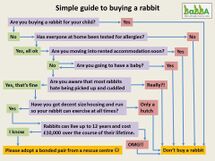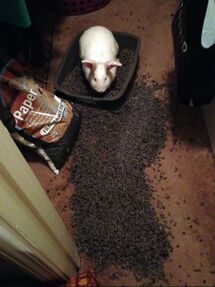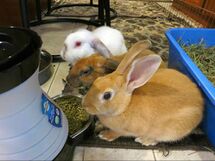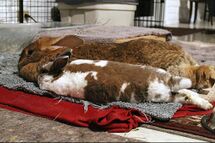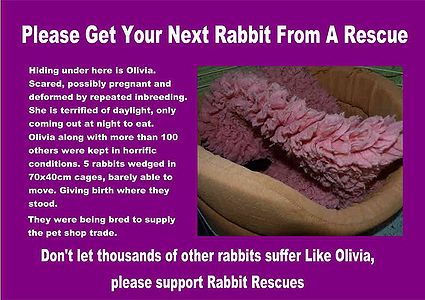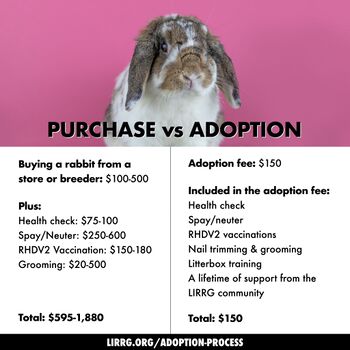Deciding on a rabbit
Getting a pet should never be an impulse decision. That being said, there are many reasons to consider a rabbit as a pet, and many reasons you might not want one. We will try to do our best to give you an idea what you will be getting into with the possession of a rabbit.
Is a rabbit right for you?
Rabbits can make excellent house pets due to their cleanliness, the ease of litter training, and the lack of vocal sounds. They are fascinating to watch and can become quite affectionate when you gain their trust. If you are a working professional, rabbits are a great pet because they will usually be sleeping during the day and become active after you get home around the evening. However, rabbits are not the most low-maintenance pets and actually have quite a few needs, and these are important to consider before you have a rabbit join your household.
- When properly taken care of, rabbits can live to an average of 8 or more years. A rabbit will be around when your child grows up and goes to college. Rabbits are not a disposable pet. If you would like a short-lived pet for at most 3-4 years, a rabbit is not the pet for you. Rabbits will also develop a deep bond with their main caretaker. Be prepared to have a place for your bun if you plan on getting married, move, have a child, or a new pet.
- Regardless of breed or sex, rabbits have their own distinct personalities. There are no temperament traits that have been selectively bred, so any breed of rabbit can have the personality you are looking for. There may be trends such as smaller breeds tending to be more mischievous and active while larger breeds tending to be more docile and easy-going, but this is not set in stone by any means. Sociability is easily influenced by the amount of time the rabbit interacts with humans. The more humans play with the bunny, the more sociable the bunny will be. As prey animals, rabbits will often also be slow to trust in new environments -- in general, they will not be like a kitten or a dog that will immediately want to interact and explore new surroundings. It can take weeks or months for rabbits to be comfortable and come out of their shell.
- Rabbits are high maintenance and require daily care. Most pets, in fact, also need daily care, but rabbits are much more sensitive to changes than the average pet. It takes a daily commitment to make sure a rabbit is in good health, has unlimited hay and water, and a clean housing enclosure. As a prey animal, rabbits hide obvious signs of discomfort until it's too late. Gastrointestinal (GI) stasis is not an unusual occurrence with rabbits, where their digestive system shuts down and stops their ability to eat until medical attention is given. A rabbit with GI stasis can easily succumb quickly without immediate care. Rabbits will also need regular grooming and be brushed at least once a week depending on breed to make sure that they do not ingest too much hair when grooming themselves. They will need their teeth to be checked annually by a vet to make sure that they are not overgrown due to insufficient chewing or genetic malocclusion. Also, rabbit nails will also need clipping every 6-8 weeks to make sure they do not get caught in materials and get torn out or broken. Rabbits are social animals, and do not do well in isolation.
- Rabbits require daily exercise. A typical commercial cage or hutch is not suitable housing for a rabbit. Rabbits love to run and need the space to do so. A caged rabbit will result in a rabbit that is depressed and antisocial. The overwhelming consensus is that rabbits should be housed indoors. On the bright side, a single apartment room with enough floor space to run and hop is enough for a rabbit to exercise in. If you are unable to allow your rabbit to roam freely outside of their housing enclosure, order an exercise pen to set up a "home base" that is a minimum of 24 square feet (2.2 square meters).
- Rabbits are herbivores. Unlike cats and dogs, rabbits cannot consume most human food. The scraps from the dinner table cannot be fed. A diet for an adult bun consists of hay, pellets, and uncooked raw vegetables. You will need to be prepared as most of these are not easily available at any supermarket.
- There are start-up and continual costs to owning a rabbit. Essential startup costs include purchasing and setting up proper housing, bunny-proofing materials, and grooming items. Continual costs include hay, pellets, vegetables, litter for their litter box, and toys. Expect to spend around 200 USD for initial costs and 20+ USD per month for a single rabbit. If your rabbit manages to destroy cords, carpets, and belongings, repairing and replacing these items repeatedly will be expensive. Spaying and neutering your rabbit if you bought it as a baby bunny will cost anywhere from 50-300+ USD depending on availability of low-cost clinics and location. Yearly vaccinations are required in most countries due to fatal diseases like myxomatosis and RHD, and we also recommend visiting a rabbit-experienced veterinarian for a yearly health checkup to catch any issues early. Please take a look at our Getting Started article to understand what kind of care a pet rabbit will need.
- Rabbits require specialized veterinarians for proper medical care. Medical care is usually more expensive for a rabbit than a cat or dog because they are classified as exotics. You will need to find a proper rabbit-experienced veterinarian to take care of your rabbit, which may be difficult to find. We would suggest that you first look and see if you have any rabbit-experienced veterinarians in your area (especially emergency veterinarians that accept rabbits) before deciding to add a rabbit to your household. Many emergency hospitals will not staff veterinarians that will see exotics like rabbits 24/7, which can end up leading to highly stressful situations when your rabbit needs immediate supportive care. Rabbits are prey animals that are great at hiding problems until they are major emergency issues. It will not help your rabbit if the closest rabbit-experienced vet is out of your immediate driving distance when you have a medical emergency like gastrointestinal stasis, which can be fatal in less than 48 hours. You can find a global community database of example rabbit veterinary bills here.
- Rabbits can be very messy. While rabbits are relatively easy to litter train, you may still get poop pellets around their cage not in their litter box. Additionally, they produce a lot of poop and pee all day and will need their litter boxes changed regularly. If they are not spayed or neutered once they reach sexual maturity, rabbits may lose their litter habits and begin pooping and spraying (peeing on walls and other objects) everywhere to mark their territory. When you own a house rabbit, expect hay to be tracked everywhere as well as fur generally flying around the room. If you like to keep a meticulous house, you will need to vacuum and clean multiple times a day.
- Rabbits can be very noisy. While they don't normally vocalize like a cat or dog, rabbits are awake at all hours of the day and can often make lots of noise chewing and digging and thumping. As a result, they are not a great pet for light sleepers if the rabbit needs to reside in the bedroom. Frustrated and bored rabbits will often chew their cage bars, which is also detrimental to their dental health. It will take a dedicated owner to figure out an appropriate setup to reduce their habitual noise if they need to be housed where the owner sleeps.
- Rabbits can be destructive. Natural instincts of a rabbit are to chew and dig. As a result, if you do not properly bunny-proof a location to which a rabbit will have access, you may find your furniture and carpet destroyed, paint and drywall stripped off the walls, and loose cables and cords chewed up. Toys will need to be provided to redirect their natural behavior to proper objects. You cannot train a rabbit to never dig and chew. If you have roommates or a family, you will need to instruct them to keep things out of a bunny's reach and off the floor. If a rabbit destroys something left in their reach, it is not their fault, since to them, everything within reach is fair game. A humorous yet realistic discussion of the extent that house rabbit owners will reorganize their home for a rabbit can be seen here. Additionally, if your rabbit is not fixed once they reaches sexual maturity, they may become more aggressive and destructive than before.
- Rabbits can be difficult to handle. Unless they have been well-handled when growing up while young, rabbits in general do not like to be picked up and can break their backs when trying to get away. Consequently, a rabbit will not be well suited to children who like cuddling or holding their pet. Rabbits like it best when people get down to their level on the floor to pet and play with them.
- Some people may be allergic to rabbits or their hay. While many people that are allergic to cats and/or dogs are not allergic to rabbits, they may be allergic to hay, an essential part of a rabbit's diet. Find out before you get your rabbit if this is the case with your family or roommates, and determine if this will be an issue for your rabbit ownership. Keep in mind that there are many different types of hay, and if you are allergic to one type, you can give your rabbit a different type of hay that you are not or less allergic to.
- Rabbit are prey animals and easily injured by predatory pets in the household. If you already own cats, dogs, or other predators like ferrets, it may not be a good idea to add rabbits to your household. While many cats and rabbits can co-habitate peacefully, some more feral cats may hunt or stress out smaller rabbits. Dogs and rabbits should never be left alone together as a playful dog may easily accidentally fatally injure a rabbit. Ferrets are highly not recommended as pets in the same household as rabbits because ferrets are innate hunters and will possibly kill the rabbit if they ever accidentally escape. See Relationships with rabbits for more resources and stories of these households with children and other animals.
- Rabbits can multiply fast. On this wiki, we do not condone intentional breeding for the common house rabbit owner. However, if you purchase two unfixed rabbits of unknown sexes and keep them together, you can easily have a large baby rabbit problem. Females can have litters of 2-10 babies as early as 2.5 months, and males can reach sexual maturity at ~3.5 months. Mothers can also be impregnated immediately after the birth of a litter. As a result, if you obtain two unfixed rabbits, you will need to keep them separate until at least one is fixed or be absolutely sure that they are both of the same sex. Rabbits are easily mis-sexed especially as babies.
Some links to read for more information have been listed below to help you decide whether a rabbit is right for you.
- Ellyn Eddy. (2022). Pet Bunny 101 – All You Should Know About Having Rabbits as House Pets
- Turning Veganese. (2013). Sunday Bunday!
- Dr. Elizabeth Bradt. (2012). Vet Connection: Are you really ready for a rabbit?
- Sacramento House Rabbit Society. (2010). How are Rabbits Different from Cats & Dogs?
- Kathy Smith. (2004). Rabbits as Companions — An Inside Look [PDF]
- Kathy Smith. (2004). The Perfect Rabbit Home (As Seen By Rabbits) [PDF]
- PetCoach. Rabbits: Is One Right For You?
- House Rabbit Society. Why Not to Rabbit [PDF]
- Save a Fluff. Things to consider before you get a rabbit
- House Rabbit Society. Are You a Rabbit Person?
- Elizabeth TeSelle. What Are Rabbits Really Like?
- My House Rabbit. Thinking About Getting a Pet Bunny?
Here are some relevant videos you can watch.
Baby rabbit vs. adult rabbit
For a first time bunny owner, we would recommend adopting an adult bunny from a rescue or shelter. Getting a baby rabbit does not necessarily enhance the human-rabbit bond. Baby rabbits are also very destructive, active, and playful while older rabbits tend to be more mellow. Personality and affection level can drastically change in a rabbit in the first year of their growth. Rabbits reach puberty around 2.5 to 4 months of age and will become very territorial and generally lose all previously training until altered. If you have bonded baby bunnies, chances are that their bond will break at around this time. After adolescence and spaying or neutering, rabbits will be much more amenable to permanent training.
If you buy a rabbit without knowing their parents, you may have no idea how large they will get. All baby rabbits are small when they are young especially if they are sold underage (8 weeks), and a seller can easily lie about a rabbit's age. True healthy and consistent dwarfs require careful breeding.
Additionally, baby rabbits are notoriously hard to sex. Rabbits bought from a backyard breeder, pet store, or an accidental litter will most likely be mis-sexed regardless of claim of experience. If you have more than one unfixed rabbit, you may end up with babies unexpectedly if they interact with each other. It only takes once as rabbits are induced ovulators, and females can have litters as early as 2.5 months. Mothers can also be impregnated immediately after the birth of a litter. If you have two baby rabbits, keep them separate until both have been fixed.
If the rabbit will be living with a child, baby bunnies are also a poor choice. Rabbits are physically delicate animals and cannot be easily held, which children tend to love to do. See Rabbits and Children for more information.
Adult rabbits have many more pros over babies for both new and experienced rabbit owners. If you adopt from a rescue or shelter, you can easily choose what sort of personality and size you wish in a rabbit. You can easily figure out which bunnies are more cuddly than others if that is a concern to you. Also, rabbits reach their full growth at around 1 year old. You do not want to end up with a ginormous rabbit unexpectedly if you were not prepared with extensive breed information on the baby rabbit.
One may think that getting an adult rabbit from a shelter or rescue is much more expensive than getting one from a flea market, pet store, or breeder for about 5 USD vs. 25-80+ USD for one at the shelter. However, considering that baby rabbits will need to be spayed and neutered as an adult, especially female rabbits as they have a high incident rate of reproductive cancers and the procedure itself usually costs anywhere from 50-300+ USD depending on location, you will ultimately save much more money adopting an altered rabbit from a shelter or rescue than buying a cheap intact rabbit. To add on, the surgery required can be very stressful for rabbit owners as there is always a risk with anesthesia and the recovery process can have issues - many experienced rabbit owners choose to adopt already neutered and health-checked animals for this reason.
Lastly, a rabbit adopted from a rescue or shelter will usually already be fixed and micro-chipped and most likely litter trained and well socialized by the time they join your family. The workers at the location or the foster parents can usually provide you much more information about an adult rabbit than a baby bunny. If you are worried that their age will mean less time spent with you, remember that indoor house rabbits can have a life expectancy of anywhere from 8 to 12 or more years. 3 years is not that much in the lifetime of a house rabbit.
The House Rabbit Society lists the following as good traits for a person who should get a baby rabbit:[1]
- has lots of time, a house that can stand to be chewed, and a stable residence
- expects accidents when baby forgets where the litterbox is
- is patient and doesn't scream on discovering the new shoes have been nibbled
- doesn't go away for a long time and leave a hyper baby locked up in a cage
- knows the cute baby may grow into a rather large rabbit and may have a different personality as an adult
- understands that when bunny matures, there will need to be a neuter/spay appointment and isn't fazed when cute baby sprays urine on the walls. S/he knows that neutering will stop the problem.
Some links to read for more information about the pros and cons of getting a baby rabbit have been listed below.
- Kathy Smith. (2004). Baby or Adult? [PDF]
- Los Angeles Rabbit Foundation. Adopt an Adult Rabbit
- Monica Cook. Myths About Baby Rabbits
Which breed?
Rabbits have individual unique personalities, unrelated to breed. If you are looking for a certain temperament, your best bet would be to visit some local shelters and rescues and talk to volunteers to find a bunny that's right for you. However, if you are set on a certain "look" to your rabbit, take a look at our Breeds article and the links below.
Some links to read for more information have been listed below.
General guides
- Kathy Smith. (2004). An Overview of Breeds [PDF]
- Amy Shapiro. Lops Are Mellow and Other Dangerous Myths
- Rabbit Rehome. Breeds
Lopped-ear breeds (e.g. Holland Lop, Mini Lop, French Lop, English Lop)
- The Rabbit Residence Rescue. Lop or Not?
- Universities Federation for Animal Welfare. (2011). Genetic Welfare Problems of Companion Animals > English Lop > Overlong Ears
- MiDOG. (2022). Lop-eared Rabbits: Floppy Ears and Infection Risk
- The Unusual Pet Vets. (2020). Lop-Eared Rabbits and Ear Disease
- Royal Veterinary College. (2019). Lop-eared rabbits more likely to suffer from ear and dental problems, study confirms for first time
Lop rabbits can be predisposed to health issues such as the following:[2]
- Ear disease - infections and abscesses.
- Teeth issues and runny eyes due to a shortened skull.
- Cecotrope issues and keeping themselves clean.
- Issues with hearing and eyesight.
- A higher incident rate for liver lobe torsion due to unknown reasons.
Dwarf breeds (e.g. Netherland Dwarf, Holland Lop, Lionhead, Polish)
- Universities Federation for Animal Welfare. (2011). Genetic Welfare Problems of Companion Animals > Netherland Dwarf > Dental Malocclusion
- RaisingRabbits.com. The Netherland Dwarf Rabbit Genetic Risks (Graphic)
Dwarf rabbits can be predisposed to health issues such as the following:
- Teeth issues and runny eyes due to a shortened skull.
- Cecotrope issues and keeping themselves clean.
- E. cuniculi
Giant breeds (e.g. French Lop, Flemish Giant, New Zealand, Californian)
- Rabbit Welfare Association & Fund. Caring for Giant Rabbits
- Rabbit Rehome. Caring for Large/Giant Rabbit Breeds
Giant rabbits can be predisposed to health issues such as the following:
- Sore hocks due to the amount of weight on their feet.
- Arthritis and spondylosis as they age.
- Cardiomyopathy and heart problems
- A shorter average lifespan of around 5-6 years.
A few experiences with giant rabbits:
- u/Mfbunnybutts. (2019). 6-month-old Flemish Giant surrendered with a plethora of health and behavior issues
Long-haired breeds (e.g. Angora, Lionhead, Jersey Wooly)
- Rabbit Rehome. Fluffy or Knot? - Caring for Long Haired Rabbit Breeds
- Magic Happens Rabbit Rescue. Caring for long-haired rabbits
- Universities Federation for Animal Welfare. (2011). Genetic Welfare Problems of Companion Animals > Angora > Long Hair
In general, we would not recommend a long-haired breed for first-time rabbit owners as they require a significant amount of grooming maintenance to keep them comfortable.
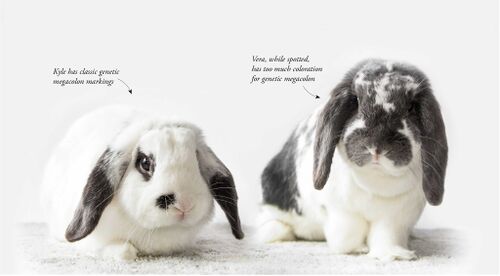
One or more bunnies?
While you may not decide to get two rabbits at first, if your first rabbit has been fixed, you may consider bonding another rabbit with him for 24/7 social companionship. The wild European rabbits that domestic rabbits are descended from are very sociable and live in warrens. If possible, we would generally recommend adopting a bonded adult neutered pair if available, especially if you know you will not be home most of the day to provide social and mental companionship for your rabbits. Bonding rabbits is not for the faint of heart and usually takes a lot of work on the part of both owners and rabbits.
If you only have unneutered baby rabbits available, we would recommend only getting one baby rabbit unless you have the space to potentially keep each in sufficiently large separated areas as they grow up due to possible difficulties with territorial fighting as they mature.
If you decide to get two baby rabbits, please make sure to get two rabbits of the same sex or keep them separated 24/7 by a double fence until they are both neutered to prevent accidental pregnancies. Rabbits can mate through a single barrier and can be fertile as early as around 12 weeks old. A successful mating can take only 3 seconds.
Amateur breeders and pet stores may be poor at properly sexing baby rabbits - as a result, if you decide to take care of more than a single baby rabbit at once, please take your baby rabbits to a rabbit-experienced veterinarian at the earliest opportunity to confirm their sexes.
Some links to read for more information on owning multiple rabbits have been listed below.
- Kathy Smith. (2004). Single, Pair, or Group? [PDF]
- Sacramento House Rabbit Society. (2010). Bonded Couples
- House Rabbit Society. (2011). Should I Get a Second Rabbit
- Happy Hoppers Rabbit Forum. (2011). Enrichment & The Single Rabbit Issue
Fostering
Before we go into details about where to get a pet rabbit from, fostering is a great alternative to buying or adopting a rabbit if you just want to see if a rabbit is the right pet for you. Fostering is also a good option for people who know they will be moving soon but would like a pet rabbit in the meantime. Most of the rabbits in foster programs will be happy and healthy, but rescues will occasionally have buns that will need a personal gentle touch to socialize them before up for general adoption. As a foster home, you will be helping with severe overcrowding at local animal shelters and giving the rabbits another chance at a good home.
Typical reasons for fostering include the following:[3]
- Spaying and neutering: Rabbits that have been recently spayed or neutered will need to be fostered for several weeks before looking for a new home.
- Socialization: Foster care allows rabbits that have been neglected without much human contact to have more attention and help in overcoming their fear of humans.
- Medical care: Rabbits that come in with medical problems need treatment before they can be rehomed.
- Overcrowding: When a rescue center does not have enough room, foster homes provide temporary housing for rabbits until space frees up after adopted rabbits.
- Pregnancy & babies: Foster homes provide a quieter environment for a recovering mother and her babies along with special attention. Very young rabbits that were abandoned may need a dedicated foster that will hand-feed them regularly.
The rescue center will be able to match you up with rabbits that fit the environment and care you can provide. Depending on the rescue center, you will be provided with training, equipment, and medical care assistance.
Some benefits of fostering include the following:
- Tax deductions if you are fostering through a qualified 501(c)(3) organization. Costs such as pet food and supplies, veterinary bills, and toys can qualify as expenses for fostering a pet. If you foster enough animals, a portion of your home utility costs can be covered as well. Car drives made solely for the organization can be deducted at 14 cents a mile.[4]
To find fostering opportunities, look at local animal shelters and rabbit rescues. Check out our Adoption Listings page to find local animal shelters and rabbit rescues.
Some stories about fostering for rescues and shelters:
- Rabbit Rehome. Fostering
Some links to read for more examples of expectations for rabbit fostering:
- House Rabbit Society. Foster
- Rabbit Rescue Inc. Fostering Benefits
- The Rabbit Haven. The Rabbit Haven Foster Program
- Bunny Buddies. Foster
- Los Angeles Rabbit Foundation. Foster
- Luv-N-Bunns Rabbit Rescue. Fostering
- Magic Happens Rabbit Rescue. Foster
Where to get a rabbit
There are many options to find a rabbit - pet stores, classified ads, shelters, rescues, breeders, and more. Here we will go more in detail as to the pros and cons of each.
Pet stores
Please do not purchase a rabbit from a pet store unless it is actually an adoption through a local rescue/shelter program. A similar source in a rural area is a feed store. Pet stores are always out to make a profit and will often have mistreated, inbred, unhealthy rabbits for sale. To elongate their cuteness, baby bunnies will typically be weaned (removed from mother) too early, which can lead to behavior and health problems.
As Cheryl Kucsera writes, [5]
Before and during the Easter season, consumer interest in baby bunnies is at its peak. In order to exploit this demand, many rabbit breeders will schedule the breeding of their rabbits so that extra litters of baby bunnies will be available at this time.
In pet store terms, baby bunnies don't have a long "shelf life." This is because they grow so very quickly. Therefore, in order to meet pet stores' desires for the "cutest" baby bunnies, some breeders may supply bunnies who are too young (under 8 weeks of age). I was told of one breeder/petmiller who supplied baby bunnies to local pet stores. Every few weeks, when he would drop off a new "shipment" of baby bunnies, he would pick up any that hadn't sold from his previous shipment. According to him, if the bunnies hadn't been purchased at that point, they never would be. So, he took them back to his home where they ended up in his freezer. He said it was more "humane" for them to end up on his plate than to languish in a cage in the pet store!
Additionally, many employees will often have little or no experience with the proper care of rabbits. You will be better off getting a rabbit anywhere but a pet store. If you must buy a pet, visit your local responsible and knowledgeable rabbit breeder. However, we would urge you to consider visiting local shelters and rescues first before going to a breeder to buy a pet. If you have any questions, the place where you obtained your rabbit from should be an excellent reliable resource.
As Kathleen Wilsbach writes:[6]
Please consider the consequences when you “rescue” a suffering rabbit by buying him from a pet store or breeder. You are rewarding that establishment for causing suffering and condemning many more rabbits to the same fate!
Refusing to purchase rabbits from pet stores causes sellers loss. Thus they stock fewer rabbits thereby causing the breeder to produce less. If no one ever bought rabbits in pet stores, breeders would stop breeding. It may seem harsh to leave pet store or breeder rabbits to their fate, but you will help many more rabbits.
However, to be realistic, if you do end up getting a pet store rabbit, do your best to make sure that they are healthy before taking them home. Make sure that the rabbits are at least 6 weeks, preferably 8 weeks of age before leaving their mother because the mother's milk affords protection against E. coli and other bacteria until the baby's own immune system can handle them.[7] Young rabbits should be lively, well-fed and plump, and have a fine sheen to the fur. If they have rough, dull fur or are thin or pot bellied, the animals are sick -- typical symptoms of bloat and coccidiosis.[8]
If you decide to be a Good Samaritan and purchase a sick or undernourished rabbit, be prepared to see a veterinarian immediately and a long, uphill battle for survival and ultimately good health. Chances are that you probably cannot trust any advice given to you by a pet store employee, so please take a read through our Getting Started page and its links on proper care.
Some links to read for more information on pet store rabbits have been listed below.
- Kathy Smith. (2004). Breeders and Pet Stores [PDF]
- BunnyLuv Rabbit Resource Center. What's Wrong with Purchasing a Rabbit at a Pet Store?
- Ameena Schelling. (2016). This Is Where Petco And PetSmart Get Their Animals (Graphic)
- Rabbit Advocacy Animal Matters. (2008). Rabbit Mills & Pet Store Cruelty
Animal shelters
A shelter or a rescue is the best location to get a rabbit, unless you were looking for a baby of a specific breed and no nearby shelters have any available at that moment. By adopting from a shelter, you will be saving a rabbit from possible euthanasia and giving them a second chance at a forever home. Most of these rabbits will be abandoned pets either surrendered or found on the streets wandering lost after they escaped or were dumped. Occasionally, rabbits may be pregnant upon reaching the shelter, and the shelter will have young rabbits up for adoption once they are weaned and fixed.
Shelter employees will most likely be very experienced in the care of rabbits if they have rabbits available. Often, local rabbit rescue members will volunteer to take care of the rabbits. You can find many young, adult, and bonded rabbits at shelters. Employees can inform you about the personalities of each rabbit before you decide to adopt. Adult rabbits will usually come fixed and microchipped while still having a low adoption fee, typically 20-50 USD. That can provide you a savings of over 300 USD once you include the costs of microchipping and spaying and neutering a baby bunny yourself.
Check out our Adoption Listings page to find shelters near you with rabbits.
Some more links to read for more information on adopting from an animal shelter have been listed below.
- Kathy Smith. (2004). Adopting from a Shelter or Rescue Group [PDF]
- Abi Cushman. Benefits of Adopting a Pet Rabbit
- The Rabbit Crossing. (2012). New Bunnies -- Why Rescue?
- Pets4Homes. Should I Buy Or Adopt A Rabbit?
- Quantifying the Shelter Rabbit Population: An Analysis of Massachusetts and Rhode Island Animal Shelters. (2012). Journal of Applied Animal Welfare Science & Faunalytics.
Rabbit rescues
A rabbit rescue will provide similar features as an animal shelter but will most definitely be educated in the proper care of pet house rabbits. Rabbit rescues will often focus on taking in abandoned or sick rabbits from shelters. Rabbits at a rescue should be well handled and socialized by foster parents, and any health issues are often fairly well covered. Many foster homes will also acclimate the rabbits to children and other pets. Most rabbits will be litter trained by volunteers as they arrive at the rescue.
However, due to the non-profit nature, adoption fees will be higher than a shelter to cover medical and spaying and neutering costs. A rabbit rescue will often also have much more stringent requirements and will interview much more extensively than at a shelter. Many rabbit rescues require that the bunnies be housed only indoors. In the case that you may not be able to take care of your rabbit due to circumstances, rabbit rescues should be more than willing to take their rabbits back at no cost. In fact, in some rescue adoption contracts, you may be required to.
The Colorado House Rabbit Society states these advantages to adopting from them:[9]
- We help you determine whether rabbits are a good choice for your situation and help you avoid mistakes in bringing rabbits into your home.
- We teach you how to care for your rabbits, how to identify symptoms requiring veterinary care before they become serious, and we put you in contact with a good rabbit veterinarian in your area. It is essential you understand most veterinarians are not able to safely treat rabbits - rabbits are "exotics" from a medical point of view, and they require veterinatians who have taken specialized training in treating them correctly.
- We are committed to helping you solve any problems which may come up as long as you have your rabbits.
- We offer a "911" service to our adopters should you have an emergency when your vet isn't available, or to help you determine if you need to see a veterinarian.
- We have a greater variety of rabbits to choose from than you will find almost anywhere in the state.
Check out our Adoption Listings page to find local rabbit rescues.
Some links to read for more information on adopting from a rabbit rescue have been listed below.
- Kathy Smith. (2004). Adopting from a Shelter or Rescue Group [PDF]
- Abi Cushman. Benefits of Adopting a Pet Rabbit
Private individuals
If you are unable to find any nearby shelters and rescues and would still like to adopt a rabbit and not resort to pet stores and breeders, you can probably find an individual nearby to adopt a rabbit from with a little effort. Check out local listings in classified ads, vet offices, shelters, or rescues, and online on sites like Craigslist and Kijiji. See Rehoming_your_rabbit#Places_to_post_ads for some ideas where to look for ads.
However, be careful that you do not support a backyard breeder accidentally and focus on legitimate rehomes. These breeders will advertise baby bunnies that were bred just to make money and have no care for the future welfare of the animals they brought into this world. Legitimate rehomes are often with accidental litters or older rabbits that may be rehomed with their current housing and food.
Some links to read for more information on adopting from an individual have been listed below.
- Kathy Smith, Adopting from an Individual
Breeders
We would advise that you take a look at animal shelters and rabbit rescues first for a rabbit that would suit your preferences, especially if they are all full. However, some people may be set in stone on a baby of a specific breed or color for whatever reason, and a breeder would be the best option for this scenario if a suitable rabbit is not available in nearby shelters and rescues at the moment. If you have the patience, we would still recommend that you wait and keep an eye out for all those local shelters and rescues to see if one that meets your criteria comes through the system. Chances are, eventually there will be.
If you decide to use a breeder, please choose and buy with care. Do not patronize backyard breeders who breed their rabbits to make money or a stall at the flea market to purchase a rabbit. Mixed breed rabbits are a flag. Conscientious breeders will not advertise their rabbits for sale on social media, in the newspaper, or on Craigslist. If possible, try to visit the environment where the rabbits are raised.
A conscientious rabbit breeder...[10][11][12][13]
- Will not contribute to the abandoned rabbit problem by abandoning rabbits in the wild or dumping excess stock in shelters and rescues. Breeders should have a "take back" policy for every rabbit they sell, whether for show, breeding, or as a pet.
- Will not overbreed rabbits. Overbreeding is defined as producing more animals than responsible outlets for culls can be found. Suitable outlets for culls include pets, show/breeding stock, and other commercial uses. Does should be allowed to rest for at least three weeks after the previous litter is properly weaned at eight weeks before being mated again.[8]
- Will put the health and welfare of their animals first. Health problems will be treated as soon as possible and treatment includes euthanasia. Rabbits will not be allowed to suffer.
- Good husbandry practices as accepted by the American Rabbit Breeders Association and/or the Rabbit Education Society will be followed. Rabbits should have clean cages, an ample supply of food, hay, and water, and have a healthy appearance with clear, dry eyes and nose, healthy looking coat, and a bright, alert, and inquisitive attitude.
- Only sells rabbits that are properly weaned and not too young to leave the rabbitry. At the minimum, this should be 6 weeks of age, 8 weeks as best. Rabbits taken from their mother too soon may suffer both physically and psychologically. Ask if the rabbit you adopt can remain with its mother until it is eight weeks old, even if this is not the breeder's normal policy.
- Will breed to ensure genetic abnormalities are not perpetuated and that only healthy rabbits conforming to the ARBA breed standards are produced.
- Will educate every rabbit buyer and provide written care instructions and be a lifelong contact for purchasers. The breeder will help you make smart decisions about whether you're ready to take on a rabbit right now.
- Will be honest and reputable.
As stated before, if you decide to take this route, please buy conscientiously. Similar to pet store considerations, check to make sure your rabbit is healthy and at least 8 weeks of age before leaving their mother because the mother's milk affords protection against E. coli and other bacteria until the baby's own immune system can handle them.[7] If the housing situation of the mother and kits does not look clean, do not buy and assume that the rabbits are not well cared for and go elsewhere. Dirty hutches can be a massive breeding ground for diseases, and there is a good chance that your new bunny will be infected. Young rabbits should be lively, well-fed and plump, and have a fine sheen to the fur. If they have rough, dull fur or are thin or pot bellied, the animals are sick -- typical symptoms of bloat and coccidiosis.
A helpful blurb from the user Crochetniac on Reddit:[14]
Do a LOT of research before you go to a breeder! If they're certified you can typically trust them, if they're on craigslist you'll need to do some detective work.
Ask to meet at their house or where they keep their rabbits, if their bunnies are in small cages, kept outdoors, or all kept together, it's best to avoid them. Your rabbit should also be at least 8 weeks before you get it, look up how big your rabbit should be at that age to make sure you don't take them home too early.
Some breeders will also be keeping their rabbits in a bunny mill situation, rabbits are pregnant for 4 weeks, and once they give birth they can get pregnant immediately, as in same day. Basically, the momma rabbit will be giving birth to her 3rd litter when her first little should barely be done weaning, which will send the poor gal to an early grave so that some selfish bastard can make a few extra bucks. Don't go to someone who sells their rabbits for snake food, you want a bunny with a good genes to ensure they're healthy as they get older.
If the rabbits are skittish, don't buy them. Breeders will tell you that "all baby bunnies are like that" but in reality it just means they aren't held enough. I've had my rabbits for almost 2 years (got them as adults) and they've had a few litters, and every bunny that has gone into a new home could be picked up without kicking. My adult rabbits aren't like that because the previous owners didn't hold them enough and they weren't held enough as kits, they've made a lot of progress but getting picked up and set down they still can get a little freaked out. My 3rd rabbit came from one of their litters, you can pick her up like you would a small dog (fingers/hands under her front legs) and she'll just let her back legs dangle. Getting a rabbit that can easily be held at 8 weeks will save you a LOT of frustration.
Some links to read for more information on buying from a breeder have been listed below.
- Kathy Smith. (2004). Breeders and Pet Stores [PDF]
See also
- Costs of rabbit ownership
- Getting started with a rabbit
- Rabbit breeds around the world
- Rabbit coat colors
References
- ↑ Monica Cook. (n.d.). Myths About Baby Rabbits. Retrieved 24 Feb 2023 from https://rabbit.org/adoption/baby-bunnies.html
- ↑ The Rabbit Residence Rescue. (n.d.). Lop or Not? Retrieved 5 Dec 2016 from http://www.rabbitresidence.org.uk/lop-or-not.html
- ↑ Rabbit Rehome, Fostering Rabbits
- ↑ Petfinder. (2014). Considering your taxes? Don’t forget your foster pets!. Retrieved 8 March 2016 from https://www.petfinder.com/blog/2014/01/considering-your-taxes-dont-forget-your-foster-pets/
- ↑ Kucsera C. (n.d.). The Monaco House Rabbit Sanctuary. Retrieved 14 Mar 2017 from http://www.pacificanimal.org/rabbits/monaco_house_rabbit_sanctuary08.htm
- ↑ Wilsbach, K. (2001). "Rescuing" Pet Store Rabbits. The Clover Leaf, (8), 9-12. Retrieved from http://rabbitsinthehouse.org/newsletter/Clover%20Leaf%20VIII%20-%20final.pdf
- ↑ 7.0 7.1 Krempels, D. (n.d.). The Mystery of Rabbit Poop. Retrieved 14 Mar 2017 from http://www.bio.miami.edu/hare/poop.html
- ↑ 8.0 8.1 Parent, L.E & Vriends, M. (1989). The New Rabbit Handbook.
- ↑ Colorado House Rabbit Society. (n.d). Advantages to Adopting from the Colorado House Rabbit Society. Retrieved from http://www.coloradohrs.org/adopt_why-us.asp
- ↑ Rabbit Education Society. (2005). The Rabbit Education Society 2005 edition. Retrieved from http://www.rabbited.0catch.com/RESstandards.html
- ↑ Colorado House Rabbit Society. (2015). "Good" and "Bad" Breeders. Retrieved 8 Mar 2016 from https://coloradohrs.org/rabbit-breeders/
- ↑ Connie Isbell, Audrey Pavia, Rabbits for Dummies
- ↑ Kathy Smith. (2004). Breeders and Pet Stores
- ↑ Reddit.com, To all new and future rabbit owners, here's the manual! (Experienced owners please feel free to post!)


